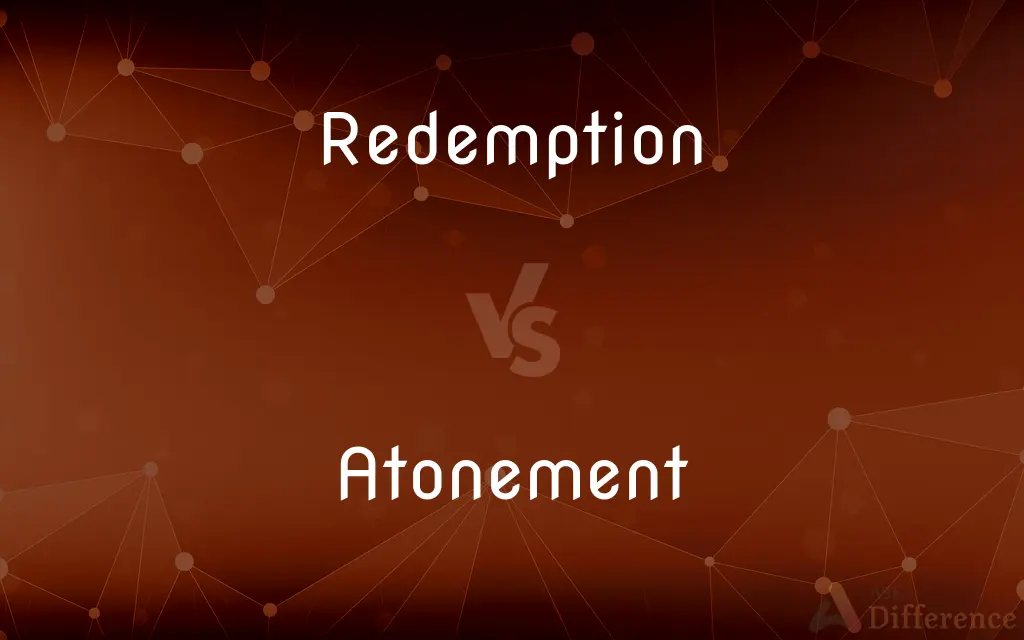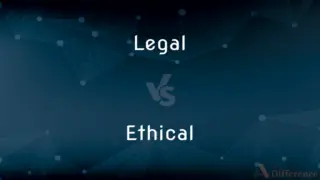Redemption vs. Atonement — What's the Difference?
By Tayyaba Rehman & Urooj Arif — Updated on March 11, 2024
Redemption involves being freed from faults or sins, while atonement focuses on making amends for wrongdoings.

Difference Between Redemption and Atonement
Table of Contents
ADVERTISEMENT
Key Differences
Redemption is primarily about the act of being saved or freed from sin, errors, or evil. It's a concept deeply rooted in many religious traditions, symbolizing the process of being delivered from a state of wrongdoing and restored to righteousness. Atonement, on the other hand, emphasizes the aspect of reparation or making amends for one's misdeeds or sins. It involves actions or sacrifices that seek to repair the damage caused by these wrongdoings, either between individuals, in societal contexts, or between humanity and the divine.
In Christianity, for example, redemption is often associated with the belief in Jesus Christ's sacrifice as a means for humanity's salvation, offering believers a path to be liberated from sin. In many religious practices, atonement is a critical step towards reconciliation, requiring an acknowledgment of one's faults and a concerted effort to make things right.
While redemption is often viewed as a state or condition bestowed upon an individual by a higher power or through an external act (such as the sacrificial of Christ in Christian theology), atonement is typically seen as a more active process. It involves personal responsibility, where the individual must take specific steps to rectify the wrongs committed, suggesting a more hands-on approach to addressing and resolving issues of guilt and sin.
The concept of redemption is closely linked to freedom and liberation. It suggests not just a release from the consequences of sin but also an opportunity for a fresh start or a new beginning. This notion of being redeemed carries with it the idea of transformation and renewal, where past errors are washed away, allowing for a renewed sense of purpose and direction. In contrast, atonement often carries with it a sense of duty or obligation to address the harm caused by one's actions. It's about restoring balance and harmony, whether in personal relationships, within a community, or between humanity and the sacred. The process of atonement can involve acts of penance, restitution, or other forms of compensation that aim to directly address and rectify the consequences of one's sins or mistakes.
Comparison Chart
Focus
Being saved or freed from sins
Making amends for wrongdoings
ADVERTISEMENT
Process
Often granted by a higher power
Involves personal effort to rectify wrongs
Associated With
Freedom, new beginnings
Responsibility, restitution
Religious Context
Salvation in Christianity
Yom Kippur in Judaism
Outcome
Transformation and renewal
Reconciliation and balance
Compare with Definitions
Redemption
A chance to start anew.
The redemption offered by the community program gave him a new lease on life.
Atonement
Act of making amends.
He sought atonement through volunteering and helping those he'd wronged.
Redemption
Central to many faiths as divine deliverance.
In his faith, redemption was key to spiritual fulfillment.
Atonement
Duty to amend errors.
Feeling a deep moral obligation, he pursued atonement to reconcile with his past.
Redemption
Deliverance from the consequences of wrongdoing.
Through faith, she found redemption and a renewed sense of hope.
Atonement
Actions taken to express remorse.
Her atonement for past mistakes involved a heartfelt apology and restitution.
Redemption
Being set free from a negative state.
The story of his redemption from addiction inspired many.
Atonement
Compensating for harm done.
The company's atonement for the environmental damage included a large donation to conservation efforts.
Redemption
A change for the better.
His journey towards redemption led to a complete transformation in his life.
Atonement
Restoring harmony in relationships.
Atonement was the first step towards reconciliation with his estranged family.
Redemption
The act of redeeming or the condition of having been redeemed.
Atonement
Atonement (also atoning, to atone) is the concept of a person taking action to correct previous wrongdoing on their part, either through direct action to undo the consequences of that act, equivalent action to do good for others, or some other expression of feelings of remorse. From the Middle English attone or atoon ("agreed", literally "at one"), now meaning to be "at one", in harmony, with someone.
Redemption
Recovery of something pawned or mortgaged.
Atonement
Amends or reparation made for an injury or wrong; expiation.
Redemption
The payment of an obligation, as a government's payment of the value of its bonds.
Atonement
(Judaism) An individual's reconciliation with God by means of repentance and confession of one's transgressions.
Redemption
Deliverance upon payment of ransom; rescue.
Atonement
(Obsolete) Reconciliation; concord.
Redemption
(Christianity) Salvation from sin through Jesus's sacrifice.
Atonement
Making amends to restore a damaged relationship; expiation.
Redemption
The act of redeeming or something redeemed.
Atonement
(archaic) Reconciliation; restoration of friendly relations; concord.
Redemption
The recovery, for a fee, of a pawned article.
Atonement
Reconciliation; restoration of friendly relations; agreement; concord.
By whom we have now received the atonement.
He desires to make atonementBetwixt the Duke of Gloucester and your brothers.
Redemption
Salvation from sin.
Atonement
Compensation for a wrong;
We were unable to get satisfaction from the local store
Redemption
Rescue upon payment of a ransom.
Atonement
The act of atoning for sin or wrongdoing (especially appeasing a deity)
Redemption
(Christianity) the act of delivering from sin or saving from evil
Redemption
Repayment of the principal amount of a debt or security at or before maturity (as when a corporation repurchases its own stock)
Redemption
The act of purchasing back something previously sold
Common Curiosities
What is the essence of redemption?
Redemption is about being saved or freed from sin, often viewed as a divine act that offers a new beginning.
What role does forgiveness play in atonement?
Forgiveness is often a key component of atonement, both in seeking it from those wronged and in self-forgiveness.
Is redemption a one-time event or a process?
Redemption can be viewed both as a moment of being saved and as an ongoing process of living in a state of grace.
What are examples of atonement in everyday life?
Examples include apologizing for harm caused, making restitution, or dedicating oneself to positive change.
Can one achieve atonement through actions alone?
Actions are central to atonement, but sincere remorse and intent to make amends are also crucial.
Is atonement always religious?
While atonement has religious connotations, it can also refer to secular acts of making amends for wrongdoings.
How does one's community influence redemption?
Community beliefs and support can play a significant role in an individual's path to redemption.
Can redemption occur without atonement?
In some beliefs, redemption can be granted without personal atonement, as it's seen as a divine gift of grace.
How does atonement differ from redemption?
Atonement focuses on making amends for wrongs through personal effort, whereas redemption involves being delivered from sin, often by an external or divine act.
How do different religions view redemption?
Different religions have varying views on redemption, often tied to their beliefs about the divine and salvation.
How do cultural differences affect perceptions of redemption and atonement?
Cultural backgrounds can shape how individuals and societies understand and practice redemption and atonement.
How do redemption and atonement contribute to societal harmony?
By addressing and resolving wrongs, redemption and atonement foster reconciliation and peace within communities.
Can atonement change past actions?
While atonement cannot change the past, it can mitigate the impact of past actions and help heal relationships.
What is the role of community service in atonement?
Community service can be a form of atonement by positively contributing to society as a way to make amends.
What is the significance of atonement in personal growth?
Atonement can lead to personal growth by acknowledging wrongs and actively working to correct them.
Share Your Discovery

Previous Comparison
Sector vs. Sphere
Next Comparison
Legal vs. EthicalAuthor Spotlight
Written by
Tayyaba RehmanTayyaba Rehman is a distinguished writer, currently serving as a primary contributor to askdifference.com. As a researcher in semantics and etymology, Tayyaba's passion for the complexity of languages and their distinctions has found a perfect home on the platform. Tayyaba delves into the intricacies of language, distinguishing between commonly confused words and phrases, thereby providing clarity for readers worldwide.
Co-written by
Urooj ArifUrooj is a skilled content writer at Ask Difference, known for her exceptional ability to simplify complex topics into engaging and informative content. With a passion for research and a flair for clear, concise writing, she consistently delivers articles that resonate with our diverse audience.














































